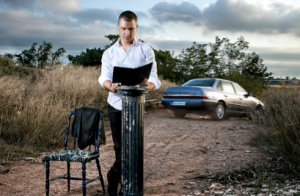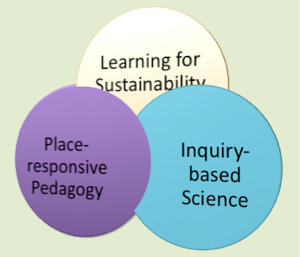Out overarching concerns were firstly, that teaching outdoors needs to be done in ways that takes some account of location – unlike our friend here! Secondly, we were concerned that science teaching needs to be made relevant, active and inquiry focussed. Lastly, we were hopeful that we might also help with making education for sustainability more accessible via active outdoor science.
The idea of teaching in a place-responsive way comes from a previous project we did at the School of Education here in University of Stirling. See: http://teachinginnature.stir.ac.uk/index.html and this article : http://www.tandfonline.com/doi/abs/10.1080/13504622.2012.749980#.VRBPLUuUdgw on “Place-responsive pedagogy”
This new project on geocaching was based on the idea of ‘place-responsiveness’ and a couple of other ideas that had to our knowledge not been put together with geocaching in mind.
The following three ideas were all core to our project approach to making geocaching more sensitive to place in ways that addressed science outcomes:
- outdoor place-responsive pedagogies, (Mannion et al 2011, Mannion et al 2012)
- active and outdoor approaches to science education, (Dillon and Scott 2002) and
- education for sustainability (Wals and Corcoran 2012).
Our hope was that geocaching could be informed by all of these ideas – at the same time!
The three themes (above) provided entry points to considering the purposes and significance of the work:
- Places are localities given meaning by human experiences in them. We feel teachers can engage learners with science through encounters with real places.
- Sense of place refers to a set of meanings of and attachments to places. Scientific understanding can add to our sense of place in ways that other subjects cannot.
- Learning for sustainability is concerned with living well together in the land, now and in the future. Science education needs to take more account of its role in addressing real world local and global issues and help us create worthwhile meanings.
- Because digital and mobile technologies are ubiquitous ‘participants’ in children’s lives, we set out to usefully explore how GPS technology can be part of the emerging pedagogy of outdoor science teaching for sustainability.


